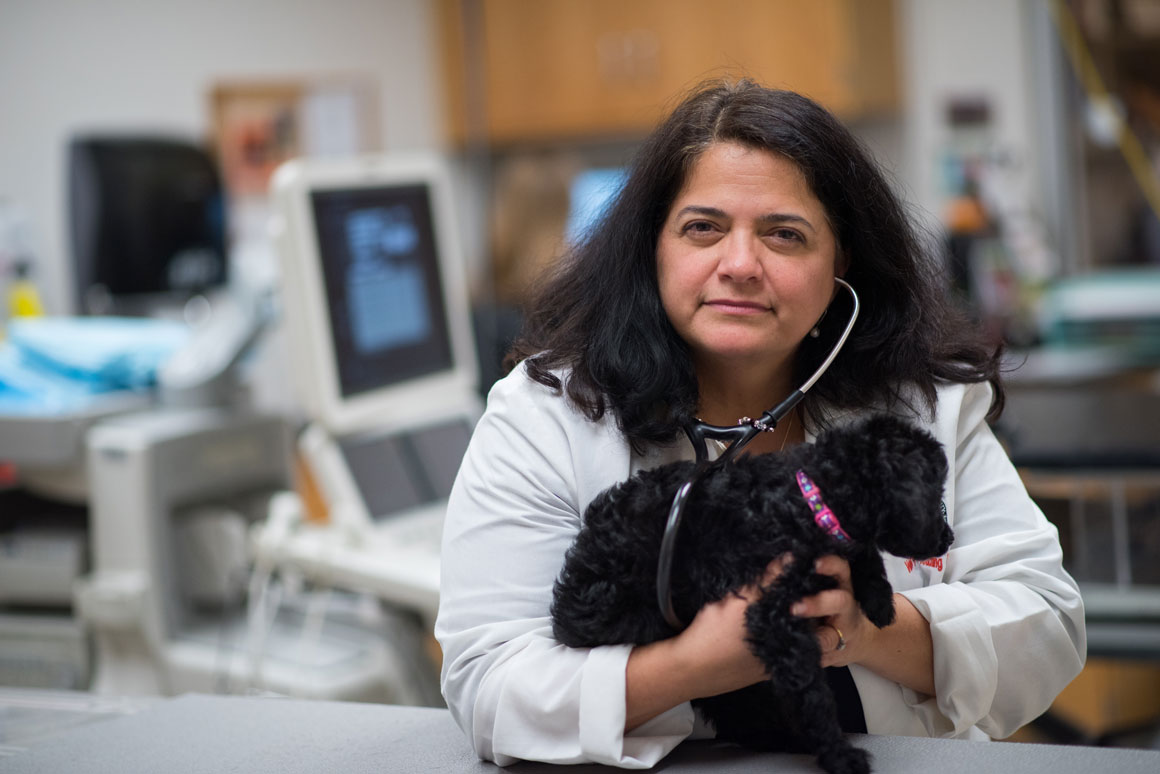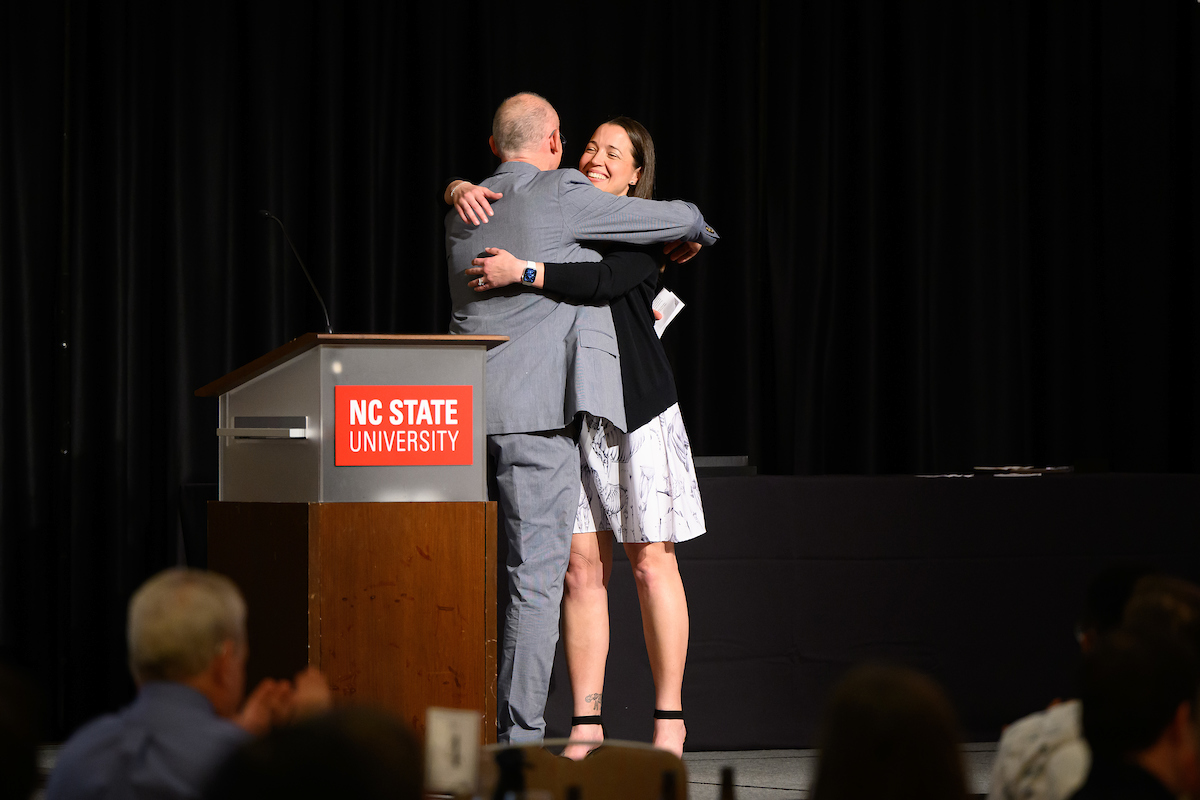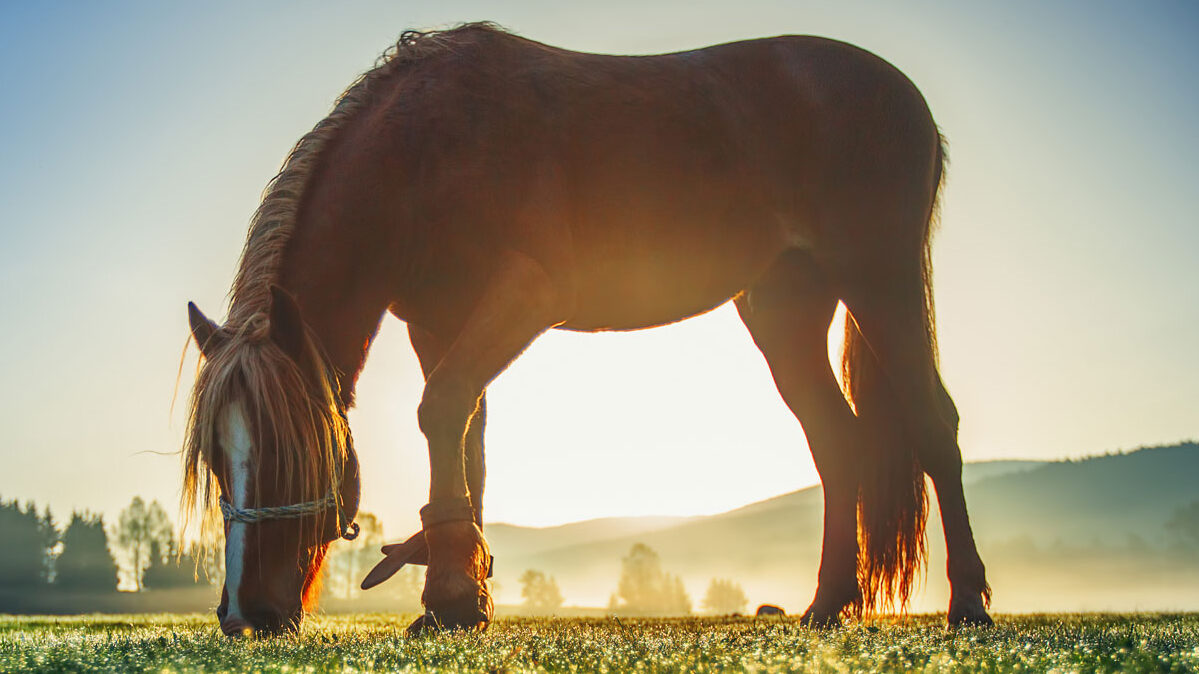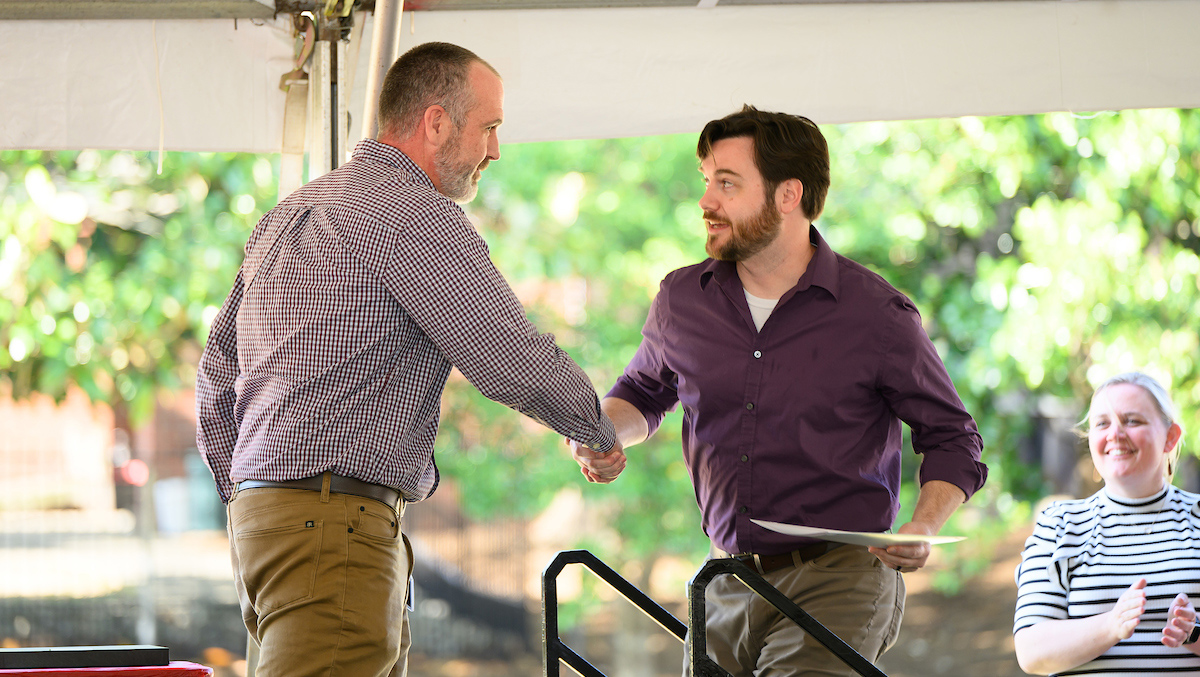Veterinary Medicine From the Heart

Known on campus as “Dr. D.” and armed with a frequently deployed infectious laugh, Teresa DeFrancesco arrived at the NC State Veterinary Hospital (VH) in 1992 for her cardiology residency and never left. DeFrancesco, now a professor of cardiology and ICU critical care, lives in Raleigh with her husband, Mike, and two children, Cecilia, 13, and Joe, 10. She talked to us about what brought her to the College of Veterinary Medicine, heart health and motherhood..
Tell me a little bit about your background. Where did you grow up and what led you here?
For the first 12 years of my life I was an Army brat. My dad was in the Army, so we traveled all over the world. Then my mom and dad divorced. My mother was Peruvian, so we went to Miami. That’s where she felt most comfortable. I went to junior high, high school and college in Miami.
I decided in my college years that I wanted to be a vet, and ended up going to Cornell for my Doctor of Veterinary Medicine. And then, long story short, I decided to be a cardiologist and NC State was one of four programs available the year that I applied. I have been here essentially ever since.
Going back to college, what was the moment that you knew you wanted to go into veterinary medicine? Did you enter with a different plan?
I really thought genetics were cool and I still do. I worked for a geneticist between my freshman and sophomore years and ended up doing a lot of research I didn’t enjoy. And then the next summer, I went to the Everglades and studied interactions between the environment, the plants and the animals. And I found that interesting, but I didn’t like the mosquitos (laughs).
And then somewhere in my junior year, my family dog broke its leg.
My mother’s side of the family is where my love of animals really came in. My mother came from a rural background in Peru and always had animals, so we always had a dog. I went to the veterinarian for my dog and that’s kind of where it happened. I had been trying to decide what to do with my love of biological sciences and working on the whole animal and trying to heal it and make it better really made sense to me. It made me happy.
What did your mom think of your decision?
She was very happy. She really loved animals. They make you happy, being around them, and she really got that. And they may chew the couch or your shoe, but that will pass. But they live so in the moment and they make you forget all of your woes and make you really enjoy life.
My dad, interestingly enough, is a city boy. He grew up in New York City and he never had an animal until he married my mom. And he was very supportive.
You mentioned that it was one of the few schools that had the cardiology program you were looking for, but beyond that what really drew you to NC State for your residency?
The reputation of the people who were going to train me. At the time it was Bruce Keene and Clarke Atkins. And although it was one of the newer vet schools, it already had the reputation of the faculty being really good.
Do you remember what the first day of your residency was like?
The first day of my residency … you know what I remember the most? Bruce taking me out to lunch to Neomonde (laughs). But I remember how nice the people were. I remember the friendly staff. My mentors were nurturing and funny and it felt like family.
As a resident you work long hours and you work hard. You do a lot of emergency work. But at the time it was fun and I enjoyed it. It didn’t seem like work to me because I loved it.
It doesn’t sound like there were a lot of nerves. You were comfortable right away?
There were times when I was nervous, for sure. There were times when a patient was ill and I had trouble figuring out what was wrong. But I don’t know. I handle stress pretty well.
How do you handle it?
I just sort of take a deep breath and figure out that it’s going to be OK. Either I need to get help, or I realize that I might not be able to solve this by myself or I tell myself to take a step back and see the forest through the trees.
Was there a particularly challenging early moment here that shaped you as a veterinarian?
One of the things that has happened in my career that has been a really good thing is when I finished my cardio residency, which was three years long, I don’t think they could justify having a third cardiologist, especially when other services were suffering. So that’s why I ended up doing emergency service and critical care. I kind of adapted and molded myself to the needs of the college.
The ICU and emergency room were getting busy and full of challenging cases, so I ended up doing half cardiology and half critical care. And even though I don’t do critical care now, for probably 18 years I did both. And it was great. I’m a better cardiologist because of that experience.
In being a part of critical care and cardiology, I’m sure it could be gut-wrenching at times. How do you approach day-to-day work?
I’m very lucky that I work with a wonderful team. The students are perhaps the least appreciated of the team, but they actually make you very accountable. They keep you honest and they keep you learning. So I think part of the secret of dealing with these really hard cases is knowing that you have this collective intelligence of people who are with you.
Talk to me a little bit about that communication with clients. That’s a big part of your work.
It is. It’s the part of the job I enjoy the most, actually. People think being a veterinarian is all about the animals, and a large part of it is. But it’s also about the people who love those animals and take care of them. I enjoy taking care of those animals. I enjoy the people behind them. I enjoy talking to them. And I think they enjoy it, too.
What do you see as the school’s place in the community and has that changed over the decades that you’ve been here?
I think our reputation has grown over the years as a center of excellence. I feel very proud about that. Every time I say I work at the vet school people are like, “Oh, that’s such a great place.” It’s such a good feeling.
I also think we have contributed to the betterment of animal life and human life. We’re always on the leading edge of diagnostics and therapies and understanding of pathophysiology. I think we need to continue to have that role in the community. I also like that we have outreach programs. I love the Dog Olympics and the Open House. I always work Open House and you see literally hundreds of young people, ranging from 2 to 20, who want to be veterinarians and love animals and they’re so excited.
When you’re not here, where could we find you?
Usually with my family. I’m married to a lovely man who is a middle-school English teacher. He’s one of the funniest men I’ve ever met. He makes me laugh every day. I have two kids, and I love being involved in their lives. Cecilia’s really into volleyball right now and getting ready to go into high school. Joe is into tennis.
Have your children expressed any interest in becoming vets?
They have on and off. Cecilia wants to be a pediatric surgeon. She likes kids and she likes surgery. She had her first dissection of a chicken wing and her teacher was like, “You did a beautiful dissection.” Now she wants a surgery kit for Christmas. And Joe goes from being a tennis pro to a lawyer to a surgeon. Surgeon comes up a lot. They really like “Grey’s Anatomy.”
Switching gears, is there such a thing as a typical day for you?
I’m on clinic duty, or hospital duty, about half of the time, so 26 weeks a year and your day is pretty predictable. It starts usually around 8 and ends usually around 6. And you’re busy the whole day. You are seeing clients, overseeing your residents and interns, answering phones, interpreting diagnostic tests, calling clients. Which is all very enjoyable, honestly.
And then the other time is less predictable. I work on clinical research projects and usually I have anywhere from three to six projects that are ongoing, in various stages and I usually do that with other people. There’s usually lectures for students. I teach the underclassmen, years one through three, a little bit. I serve on a few committees. I’m on the hospital board. I’m an assistant department head, too, so there’s usually meetings. There’s probably 10 to 20 things that occupy my time during off-clinic time.
Have you had experiences with your own pets that have guided your work here?
I’ve had five dogs in my life and I think every dog has taught me something different. One of my dogs was really aggressive to people she didn’t know and to other dogs. We worked through it and that was a hard experience. So now when I meet a client who has a dog that’s very similar, I can empathize with them.
What are some important things to be aware of when it comes to your pet and heart health?
In North Carolina, one very preventable type of heart issue in a dog is heartworm disease, so making sure they’re on heartworm preventive medicine is really important. I think the other thing is that dogs and cats don’t commonly get the same types of heart diseases that people do. The most common cause of heart disease in dogs is something called mitral valve disease, where their mitral valves fail, and it usually affects older small breed dogs. And probably 75 percent of dogs we see here with heart disease or heart failure have that disease. Although we can’t prevent the development of the mitral valve disease, we now feel pretty confident that there are medicines that can be given in the early stages to delay progression to heart failure. So early detection in heart disease is important.
There are certain breeds that we know have high incidences of heart disease, like boxers, cavaliers and Dobermans and Maine coon cats, so we generally recommend screenings, There’s a few breeds that probably should get screened even if you don’t hear a heart murmur or an irregular heartbeat because we really believe early intervention will delay progression.
Finally, what do you think makes a good vet a great vet?
Open-mindedness, because medicine changes. What we did 50 years ago is not the same thing we do today. Medicine is an ever-changing craft. And I’ve really learned that by being at a center where we’re always challenging the status quo, we’re always improving, we’re always getting better.
Always striving to be better, too. And enthusiasm. And being a good observer and a good communicator. It’s interesting, you have to have a combination of these skills. You have to be detailed oriented but you also have to be able to see the big picture.
~Jordan Bartel/NC State Veterinary Medicine
- Categories:


